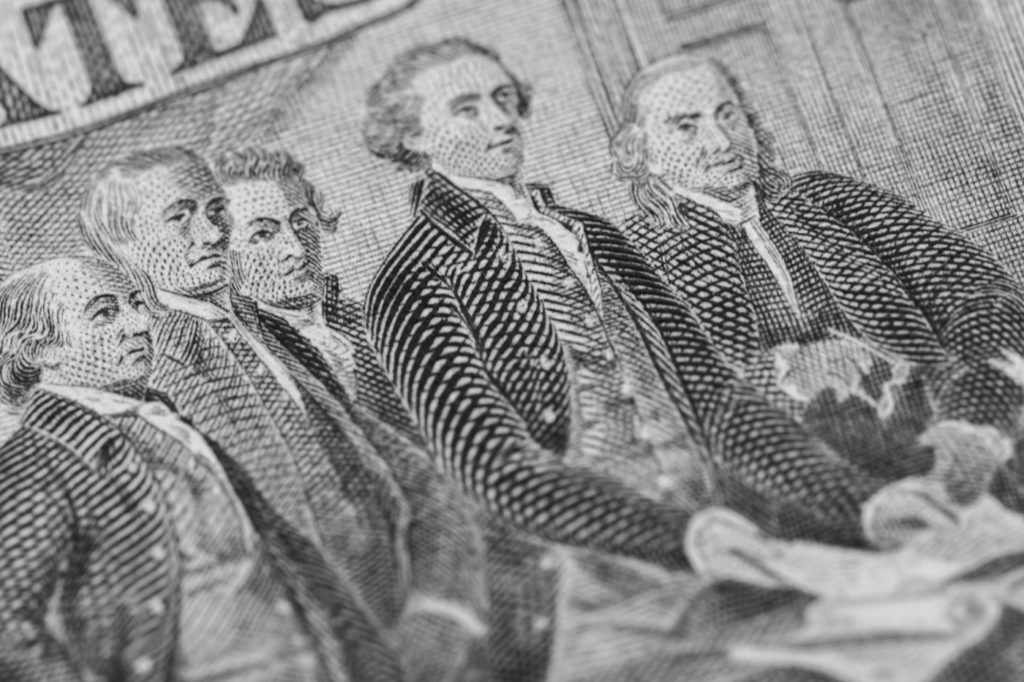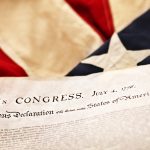If there is one truth that has been confirmed by the 1619 Project, it is that many American liberals and progressives have no particular attachment to the American Founding. This, however, is not new. One prominent early twentieth-century progressive, Woodrow Wilson, regarded constitutional order largely as a matter of historical contingency, and he viewed the Founding in that light. This much is evident from the future president’s address to the Jefferson Club of Los Angeles on May 12, 1911, during which Wilson told his audience, “If you want to understand the real Declaration of Independence, do not repeat the preface.”
If there is one truth that has been confirmed by the 1619 Project, it is that many American liberals and progressives have no particular attachment to the American Founding. This, however, is not new.
Wilson’s difficulties with the Declaration’s preamble—with its unambiguously universalistic invocation of “the Laws of Nature and of Nature’s God,” and with its non-relativist insistence that “all men are created equal” and “endowed by their Creator with certain unalienable Rights”—were twofold. First, he understood that the stringent protections implied in such rights would obstruct the realization of his German-inspired administrative state and of rule by enlightened experts like himself. Second, Wilson’s historicist mindset made him view the Declaration’s claims as time-bound and of limited relevance to the here and now.
After World War II, most American conservatives placed the Founding at the center of their thought, not least because it delegitimized efforts by their opponents to detach liberty from the guidance of right reason and, many would add, from revelation. Over the past ten years, however, some conservatives have contended that modern liberalism’s gospel of autonomy and diversity over and against reason and truth represents the logical working out of that same Founding. They consequently do not believe that recourse to the Founding can save America from the nihilist implications of Justice Anthony Kennedy’s “mystery of life” passage in Planned Parenthood v. Casey. On the contrary, these statements are presented as the Founding’s fulfilment.
Such analyses have been given forceful expression by scholars like Patrick J. Deneen and Michael Hanby. Their arguments have been challenged, particularly for their genealogy of ideas. Is there a more or less direct link between aspects of John Locke’s thought, via James Madison’s Federalist 10, to Justice Kennedy’s jurisprudence? Does the trajectory run so straight—or exist at all?
Start your day with Public Discourse
Sign up and get our daily essays sent straight to your inbox.In America on Trial: A Defense of the Founding, Robert R. Reilly has penned what is thus far the most systematic attempt to refute this Founding-skeptic narrative. Reilly does not deny that liberty has collapsed in many Americans’ minds into license. He nevertheless holds that this situation owes little to the Founding. For him, the Founding represents a powerful re-expression of a Western tradition far older than modern liberalism. Its lineage, Reilly says, stretches as far back as the Hebrew Bible and consequently articulates a very different understanding of human freedom.
Where Does America Really Come From?
An appeal to reason, natural law, and natural rights is, according to Reilly, fundamental to the American Revolution. Its rhetoric of liberty was expressed within that decidedly non-relativistic framework, not outside it.
Minds ranging from John Adams to Alexander Hamilton did not create this discourse ex nihilo. Like Deneen and Hanby, Reilly sees ideas as working their way through time in often circuitous ways. The Revolution’s fight for “the primacy of reason” against “the primacy of the will” involved, Reilly argues, the reassertion of “Christian and natural law assumptions” against the conviction that whatever the ruler wills is right (be it a monarch, parliament, or mob) because the ruler willed it.
It is to Jerusalem, Athens, and Rome that Reilly traces these assumptions. At their core is the idea of God-as-Logos. The legacy of Jewish monotheism, ideas expressed by particular Greeks like Plato and Aristotle, and Roman Christianity’s integration of these insights revolve around the realization that God is not an arbitrary, capricious deity like Zeus or Baal. Instead he is the Creator who remains active in the world and who embodies Divine Reason, the light of which has been pressed upon the human mind made in his image. Absent such a foundation, it’s not hard for societies to end up in Justice Kennedy’s universe.
Yes, it took centuries and much disputation for the political implications of such ideas to be realized. But eventually, Reilly writes, they produced a flowering of a freedom-oriented constitutionalism in the medieval period. Of course, the medieval world was also rife with injustices. It was not congenial to be a Jew in thirteenth-century Europe. Reilly nonetheless maintains that worked-out notions of the consent of the governed, the essential liberty and equality of all before the law, and the ensuing need to constrain state power are all products of this era. They reflect the sway of natural law reasoning and particular religious conceptions of human nature and God. Without this specific background, it is hard to envisage documents like Magna Carta ever being written.
None of these developments was seamless. Power politics also played a role. Nor is there any disputing that nominalism (the denial that there are essences beyond any one individual’s reality) and voluntarism (the idea that God’s will is the first and only cause of things, and that his will is not bound by anything, including reason) are also products of medieval minds, and that they are antithetical to the very possibility of what the Declaration of Independence called unalienable rights. Indeed, nominalism and voluntarism’s contestation of natural law and of God-as-Logos—and, therefore, of specific conceptions of liberty, equality, and happiness—set the stage for a debate in the modern period to which the American Founding was one response.
Bad Locke, Good Locke
By Reilly’s account, several thinkers played key roles in this war of ideas. For Thomas Hobbes, there was no summum bonum or teleology for reason to know. Hence the political issue for Hobbes became how to create order in the midst of thousands of individuals as they sought to impose their own meaning on human existence. Such ideas provided some of the theoretical foundations for absolutism and the Divine Right of Kings. While Founders like Adams and Jefferson argued about many things, Reilly states that they rejected Hobbes’s rationale for authority as inimical to the claims of reason and liberty that underpinned the Revolution’s principles. In his 1775 essay The Farmer Refuted, Hamilton even described Hobbes’s doctrine as “absurd and impious”—that is, against reason and true religion.
Another crucial figure in Reilly’s account took a line very different from Hobbes’s. The Anglican divine Richard Hooker, Reilly illustrates, kept alive and reformulated natural law arguments and their implications for constitutional order in post-Reformation England. This allowed such ideas to be eventually transmitted to British America. Hooker, Reilly points out, was a major reference-point for those believing and nominal Anglicans who helped to draft key Revolutionary texts. His writings also shaped the thought of the Revolution’s most prominent natural law thinker, James Wilson.
It is by way of this route that Reilly arrives at the crux of his argument. Much of the conservative debate about America’s Founding functions as a proxy for the never-ending Locke wars. Founding-skeptics generally regard John Locke as deeply problematic and his influence on the Founding as one reason for its lamentable long-term fruits.
Reilly freely acknowledges those features of Locke’s thought, such as his empiricist methodology and his way of defining happiness in terms of pleasure and pain, that are in tension with the broader tradition on which he believes the Founding is grounded. But Reilly underscores how other aspects of Locke’s work concur with that same tradition. For Locke, he writes, “happiness is not whatever man says it is.” Reilly underscores how Locke saw true pleasure in terms of acting, as Locke wrote in different places, in “the ways of virtue,” of doing “what is fit to be done,” and in “denying ourselves the satisfaction of our own desires, where reason does not authorize them.”
But what really matters, Reilly maintains, “is how the Founders understood Locke, and to what purpose they applied their understanding.” James Wilson, for example, was fully aware of those ambiguities in Locke that, he believed, helped to facilitate skepticism. The point, however, for Reilly is that Wilson and other Founders deployed Locke in ways that illustrate that they read him in the context of their appreciation of Hooker and their detestation of Hobbes: i.e., in light of the wisdom inherited from the natural law tradition and Revelation. They therefore rejected the view that man is a merely material creature, who is incapable of self-government and destined to be ruled by unaccountable sovereigns.
If all this is true, it starts to look very dubious to argue that James Madison’s Federalist 10 was a gateway drug, by which radical Lockean individualism entered America’s political bloodstream and led the Supreme Court to canonize relativism. A more likely candidate for American decline, Reilly establishes, is the nineteenth-century German historicism that shaped American progressives like President Wilson and John Dewey. Its intellectual roots are about as distant from the notions of natural law, natural rights, Revelation, and God-as-Logos as it is possible to be.
Some Lacunae
Like the Locke wars, debates about the Founding are not going away soon. Yet there are important pieces of evidence pertinent to the discussion, which, to my knowledge, neither Reilly nor his interlocutors have engaged. These tend to bolster Reilly’s position.
Reilly’s is not only an argument to which Founding-skeptics will have to respond. It should give equal pause to enthusiasts of endeavors like the 1619 Project who are determined to reconceive the very idea of America along lines that subordinate truth to ideology.
One concerns other natural law influences on the Founders’ thinking. Blackstone’s Commentaries on the Laws of England, for example, were widely read by the Founding generation, which attached great importance to English common law. Blackstone’s introduction specifically cites and affirms the universally binding claims of natural law; significant revolutionary writings such as Hamilton’s Farmer Refuted quoted these passages at length to explain the foundation of rights. Nor can we discount the Founders’ constant references to the law of nations—the ius gentium, especially as articulated by modern Protestant natural law thinkers like Emer de Vattel. It embodied those rules and norms of behavior that different regimes had come to recognize as reasonable for all nations to embrace. These traditions do not lend themselves to skepticism or relativism.
Then there is the Scottish Enlightenment’s outsized impact on colonial America. This is evident from the books that filled the libraries of educated eighteenth-century Americans and their colleges, thanks, in part, to Presbyterian ministers and university presidents like John Witherspoon. These collections included much more than the works of David Hume and Adam Smith. They also contained philosophical writings by figures like Francis Hutcheson; such books discoursed on happiness-as-embracing-the-virtues as much as they spoke the language of natural rights.
Hutcheson’s Philosophiae Moralis Institutio Compendiaria (1742/1745), for instance, was read by three generations of eighteenth-century Americans in colonial educational settings. It integrated an understanding of God as a benevolent Being and a positive view of man’s nature into formal instruction in natural and civil law. The book also took a firm position against Hume’s skepticism and underscored Hutcheson’s ultimate adherence to a religious foundation for ethics. Or consider Hutcheson’s fellow Scot, James Wilson. Toward the end of his life, the late Daniel N. Robinson illustrated just how much Wilson drew upon—to the extent of paraphrasing—the Scottish common-sense philosopher and critic of Hume, Thomas Reid, to explicate the connections between rights and what Reid called, in his 1785 essay “On Reasoning,” “the common principles of human nature.”
It is not plausible that such thinkers would have contended that “At the heart of liberty is the right to define one’s own concept of existence, of meaning, of the universe, and of the mystery of human life.” As Robinson explained, Founders like James Wilson sought “to make clear that the principles on which the entire enterprise was launched were neither local nor situational nor even historical. Rather, they are universal, and thus the creation of the United States exemplifies what the motto conveys: Novus ordo seclorum.”.
That universality, according to Reilly, was implicit in the integrated vision of Jerusalem, Athens, and Rome that he believes the American Founding sought to restate in a New World. I find his case convincing. But Reilly’s is not only an argument to which Founding-skeptics will have to respond. It should give equal pause to enthusiasts of endeavors like the 1619 Project who are determined to reconceive the very idea of America along lines that subordinate truth to ideology. When considered against the Founding and its philosophical and theological background as explicated by Reilly, such understandings of America, and of what it should mean to be an American today, seem very feeble and ahistorical indeed.













